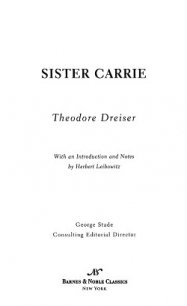Jennie Gerhardt - Драйзер Теодор (книги без регистрации бесплатно полностью сокращений .txt) 📗
She didn't trust herself to say anything more, and he felt that it was
useless to worry. Why should he? After all, he had an ample income that
was absolutely secure for two years yet. He could have more if he wanted
it. Only his brother was moving so dazzlingly onward, while he was
standing still—perhaps "drifting" would be the better word. It did seem a pity; worst of all, he was beginning to feel a little uncertain of himself.
CHAPTER XLVIII
Lester had been doing some pretty hard thinking, but so far he had been
unable to formulate any feasible plan for his re-entrance into active life.
The successful organisation of Robert's carriage trade trust had knocked
in the head any further thought on his part of taking an interest in the
small Indiana wagon manufactory. He could not be expected to sink his
sense of pride and place, and enter a petty campaign for business success with a man who was so obviously his financial superior. He had looked
up the details of the combination, and he found that Bracebridge had
barely indicated how wonderfully complete it was. There were millions in
the combine. It would have every little manufacturer by the throat.
Should he begin now in a small way and "pike along" in the shadow of his giant brother? He couldn't see it. It was too ignominious. He would be running around the country trying to fight a new trust, with his own
brother as his tolerant rival and his own rightful capital arrayed against him. It couldn't be done. Better sit still for the time being. Something else might show up. If not— well, he had his independent income and the
right to come back into the Kane Company if he wished. Did he wish?
The question was always with him.
It was while Lester was in this mood, drifting, that he received a visit
from Samuel M. Ross, a real estate dealer, whose great, wooden signs
might be seen everywhere on the windy stretches of prairie about the city.
Lester had seen Ross once or twice at the Union Club, where he had been
pointed out as a daring and successful real estate speculator, and he had noticed his rather conspicuous offices at La Salle and Washington Streets.
Ross was a magnetic-looking person of about fifty-years of age, tall,
black- bearded, black-eyed, an arched, wide-nostrilled nose, and hair that curled naturally, almost electrically. Lester was impressed with his lithe, cat-like figure, and his long, thin, impressive white hands.
Mr. Ross had a real estate proposition to lay before Mr. Kane. Of course
Mr. Kane knew who he was. And Mr. Ross admitted fully that he knew
all about Mr. Kane. Recently, in conjunction with Mr. Norman Yale, of
the wholesale grocery firm of Yale, Simpson & Rice, he had developed
"Yalewood." Mr. Kane knew of that?
Yes, Mr. Kane knew of that.
Only within six weeks the last lots in the Ridgewood section of
"Yalewood" had been closed out at a total profit of forty-two per cent. He went over a list of other deals in real estate which he had put through, all well-known properties. He admitted frankly that there were failures in the business; he had had one or two himself. But the successes far out
numbered the bad speculations, as every one knew. Now Lester was no
longer connected with the Kane Company. He was probably looking for a
good investment, and Mr. Ross had a proposition to lay before him.
Lester consented to listen, and Mr. Ross blinked his cat-like eyes and
started in.
The idea was that he and Lester should enter into a one-deal partnership, covering the purchase and development of a forty-acre tract of land lying between Fifty-fifth, Seventy-first, Halstead Streets, and Ashland Avenue, on the south-west side. There were indications of a genuine real estate
boom there—healthy, natural, and permanent. The city was about to pave
Fifty-fifth Street. There was a plan to extend the Halstead Street car line far below its present terminus. The Chicago, Burlington & Quincy, which ran near there, would be glad to put a passenger station on the property.
The initial cost of the land would be forty thousand dollars which they
would share equally. Grading, paving, lighting, tree planting, surveying
would cost, roughly, an additional twenty- five thousand. There would be
expenses for advertising—say ten per cent. of the total investment for two years, or perhaps three— a total of nineteen thousand five hundred or
twenty thousand dollars. All told, they would stand to invest jointly the sum of ninety-five thousand, or possibly one hundred thousand dollars, of which Lester's share would be fifty thousand. Then Mr. Ross began to
figure on the profits.
The character of the land, its saleability, and the likelihood of a rise in value could be judged by the property adjacent, the sales that had been
made north of Fifty-fifth Street and east of Halstead. Take, for instance, the Mortimer plot, at Halstead and Fifty-fifth Streets, on the south-east corner. Here was a piece of land that in 1882 was held at forty-five
dollars an acre. In 1886 it had risen to five hundred dollars an acre, as attested by its sale to a Mr. John L. Slosson at that time. In 1889, three years later, it had been sold to Mr. Mortimer for one thousand per acre,
precisely the figure at which this tract was now offered. It could be
parcelled out into lots fifty by one hundred feet at five hundred dollars per lot. Was there any profit in that?
Lester admitted that there was.
Ross went on, somewhat boastfully, to explain just how real estate profits were made. It was useless for any outsider to rush into the game, and
imagine that he could do in a few weeks or years what trained real estate speculators like himself had been working on for a quarter of a century.
There was something in prestige, something in taste, something in
psychic apprehension. Supposing that they went into the deal, he, Ross,
would be the presiding genius. He had a trained staff, he controlled giant contractors, he had friends in the tax office, in the water office, and in the various other city departments which made or marred city improvements.
If Lester would come in with him he would make him some money—how
much he would not say exactly—fifty thousand dollars at the lowest—
one hundred and fifty to two hundred thousand in all likelihood. Would
Lester let him go into details, and explain just how the scheme could be
worked out? After a few days of quiet cogitation, Lester decided to
accede to Mr. Ross's request; he would look into this thing.
CHAPTER XLIX
The peculiarity of this particular proposition was that it had the basic
elements of success. Mr. Ross had the experience and the judgment which
were quite capable of making a success of almost anything he undertook.
He was in a field which was entirely familiar. He could convince almost
any able man if he could get his ear sufficiently long to lay his facts
before him.
Lester was not convinced at first, although, generally speaking, he was
interested in real estate propositions. He liked land. He considered it a sound investment providing you did not get too much of it. He had never
invested in any, or scarcely any, solely because he had not been in a realm where real estate propositions were talked of. As it was he was landless
and, in a way, jobless.
He rather liked Mr. Ross and his way of doing business. It was easy to
verify his statements, and he did verify them in several particulars. There were his signs out on the prairie stretches, and here were his ads in the daily papers. It seemed not a bad way at all in his idleness to start and make some money.




